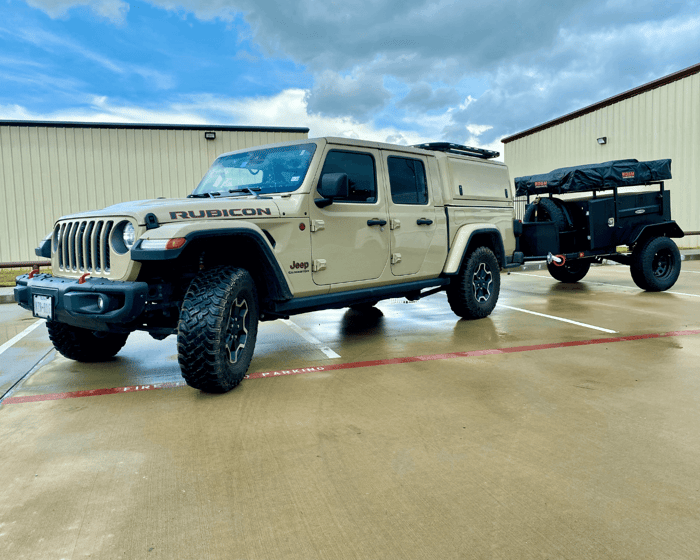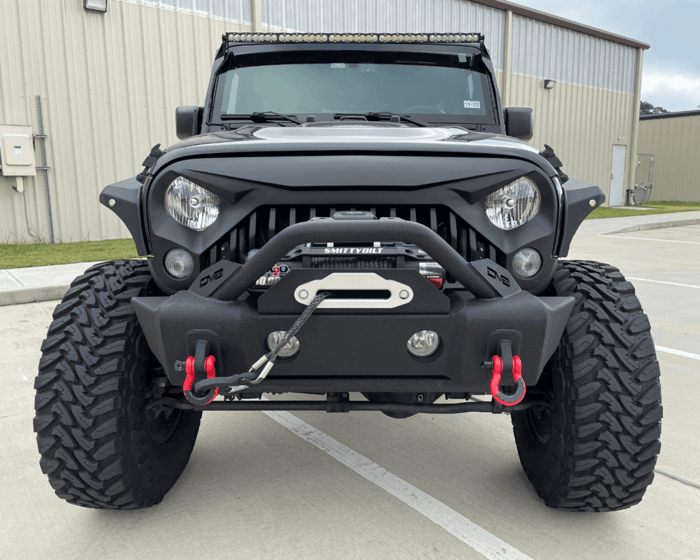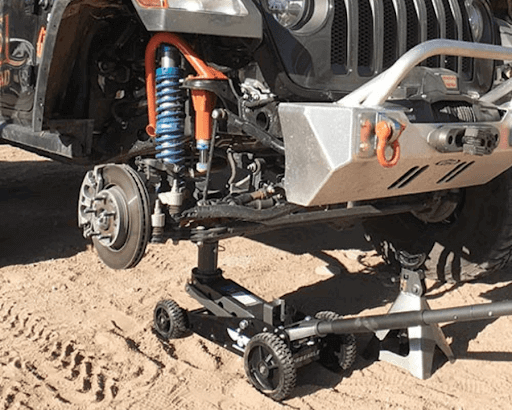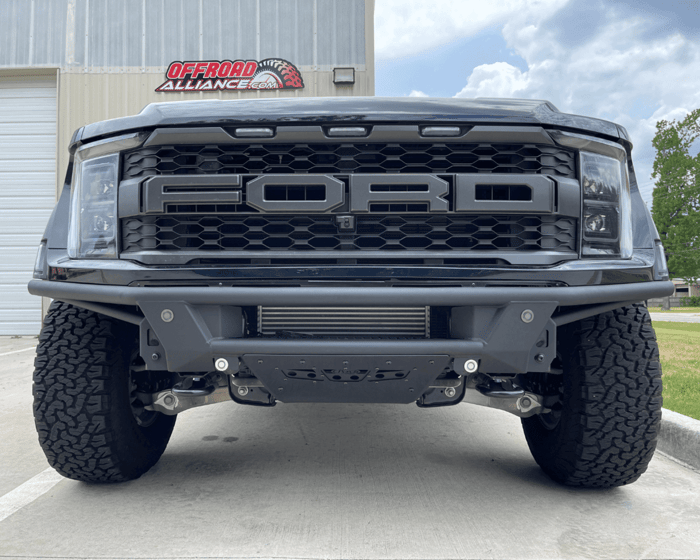
Off-Road Towing: Tips to Help You Prepare
Off-road towing can be an exciting way to step up your adventures in your customized truck or SUV. Trailers give you more cargo capacity, letting you haul more gear and supplies. If you’re the kind of overlander who’s never ready to head back home, a trailer lets you put off the return trip one more week. Meanwhile, any off-roader who enjoys getting together with friends can enjoy being the hub of the campsite, watering hole, or break-time clearing by bringing along the extra shade, gear, and beer needed to kick back and relax. It’s important to remember, however, that 4X4 towing can add another degree of difficulty to an already challenging sport, so doing your research and getting prepared before you take the trailer out into the wild is a must.
Know Your Vehicle
You’re most likely familiar with the cargo capacity of your vehicle. Many of you may have already hit that maximum weight capacity, which is why you’re reading an article about off-road towing. Towing capacities are usually far greater than a vehicle’s cargo capacity because rather than supporting all that additional weight on your truck’s springs and suspension, you’re only supporting a portion of it (if properly balanced) transferred through the drawbar to your hitch, and the trailer’s own suspension system is managing the rest. This makes it great for heavier gear that would tax your vehicle’s limits. In addition, trailers come in a variety of styles and sizes. This means you can more easily haul oversized equipment, whether for work or play. It also means your trailer may fit a larger rooftop tent than your vehicle can support on its own. It’s not uncommon to see trailers set up as an overlanding base camp, leaving the tow vehicle free and unencumbered for wheeling. That doesn’t mean, however, you don’t still have to account for the weight of all that extra gear when planning your loadout.
In addition, trailers come in a variety of styles and sizes. This means you can more easily haul oversized equipment, whether for work or play. It also means your trailer may fit a larger rooftop tent than your vehicle can support on its own. It’s not uncommon to see trailers set up as an overlanding base camp, leaving the tow vehicle free and unencumbered for wheeling. That doesn’t mean, however, you don’t still have to account for the weight of all that extra gear when planning your loadout.
Make sure you are familiar with your truck’s gross vehicle weight rating, the hitch’s maximum weight rating, and its maximum towing capacity. Ensure you understand how your trailer will distribute weight to the vehicle and how much. It’s also a good idea to allow yourself a healthy safety margin. Take your maximum tow rating and multiply it by 0.75, using the results as your maximum if you’re new to off-road towing. Remember, that rating was based on towing on paved city streets, and you’ll be adding two unpowered wheels you’ll have to pull through obstacles. Your trailer can be “overloaded” even when it’s not technically overloaded under the right circumstances.
Know Your Trailer
If you’re getting ready to take your budget utility trailer on the trail, you may want to reconsider. Your trailer needs to be able to handle the bumps and bounces of the terrain you’re tackling. Whether your off-road towing plans include a camper, traveling kitchen, or more cargo space, the trailer needs to match the ground you’re likely to encounter. Hard-packed dirt roads will be fine for most trailers, but anything wilder will need to have bigger tires and a heavier suspension system.
While trailers made specifically for 4X4 towing off the beaten path may cost a little more than road-ready models, you’ll get more use from them. These trailers may have longer or articulated drawbars, wheels and tires that match your trucks, heavier springs, and even powered features that make managing your load over uneven terrain easier. Getting a trailer built for the job lowers the risk you’ll need to ferry gear back home from a broken hauler.
Get Your Gear
 Before you hit the trail for some off-road towing action, you’ll want to make sure you’re properly outfitted. While much of the gear needed for the trailer itself is going to be highly need-dependent on what you’re using your trailer for, there are some equipment additions to make to ensure you’re ready for a successful off-road trip and to recover your vehicle or trailer if the need arises.
Before you hit the trail for some off-road towing action, you’ll want to make sure you’re properly outfitted. While much of the gear needed for the trailer itself is going to be highly need-dependent on what you’re using your trailer for, there are some equipment additions to make to ensure you’re ready for a successful off-road trip and to recover your vehicle or trailer if the need arises.
- Traction Boards - Traction boards, like the ARB TRED Pro Recovery boards, which comes in a variety of colors, are often used under wheels that can’t get the needed traction to pull themselves out of an obstacle. When using them for trailers, they create an angled surface in an obstacle for you to pull a wheel up. This not only makes it easier to pull the dead weight of the trailer out of an unseen obstacle, but lowers the risk of damage to your trailer’s axle by giving the wheel a gentler path up and out that puts less angular stress on the hub.
- Shovel - Shovels are great for both clearing space under a wheel to place a traction board and filling in space under a wheel when it’s needed. They can also be used to level out some obstructions, making sure you have a clearer travel path when necessary. The Krazy Beaver Shovel XL features a generous surface area to move more earth faster while the serrated “teeth” chew through icy soil and small roots effortlessly.
- Tow Strap - A good tow rope is a must-have for a slow, even pull, whether it’s redirecting the force from other recovery equipment, securing lateral motion, or being used to pull out a trailer from more stable ground. Unlike snatch ropes which work better for recovery on vehicles that will be able to steer and stop themselves, tow ropes or straps lack the springiness that can result in a heavy, uncontrolled trailer heading toward the rear of your vehicle or a bystander. The Hi-Lift Recovery Strap gives you 30 feet of play to work with when pulling yourself or your trailer out of a jam, and a substantial 30,000 lbs rating–plenty for most vehicle-trailer combos.
- Winch - A good winch is always handy on an off-road vehicle, but doubly so for off-road towing. Make sure to get a larger winch than would be needed for your truck by itself, as this can help account for the extra weight of the trailer. Make sure you understand proper winching technique, as it may be required more often for difficult maneuvers to help power your vehicle and its heavy, unpowered trailer through obstacles. The Warn ZEON Platinum 12-S gives you 12,500 lbs. of pull with a host of features in the palm of your hand, thanks to the convenient remote. It comes with 90 feet of Spydura Pro synthetic rope that’s ready for a Factor 55 Ultrahook and big pulls.
- Matching Rims - Ensuring your trailer wheels and tires match your custom off-road vehicles is an added expense that pays for itself the first time you have a flat and don’t have to start mixing and matching to get home. It also means you can carry fewer spares instead of one or two for the vehicle and one or two for the trailer.
Towing Tips
- Mistakes are Magnified - When you’re towing off-road, slip-ups in your driving techniques can result in outsized consequences. Failure to correctly judge the steepness of an entry or exit, loss of traction on slippery surfaces, and a failure to safely brake is exacerbated by the heavy trailer, making them higher risks of causing serious complications and damage.
- Slow as You Have To, Fast as You Safely Can - With 4X4 towing, you’re effectively converting your vehicle to 4X6 or 4X8. Those unpowered wheels will create extra drag on surfaces as you accelerate, and unless your trailer has brakes, it will try to carry on its momentum in the event of a stop, as you slow down, or going around curves. Plan for this extra momentum and use your defensive driving skills.
- Take a Spotter - When off-road towing, avoid wheeling alone. A spotter can help you locate potentially damaging obstacles, find your lines, and help you with more precise wheel placement. If you don’t, you must become the spotter, frequently stopping to scout ahead and plan your maneuvers around the terrain carefully.
- Use 60/40 Loading - Your trailer should always have 60% of the weight in front of the axle and only 40% behind it. This ratio keeps more weight on the tongue of the trailer for better control but without putting unneeded weight and strain on your rear suspension. Make sure you secure your load, as a load shift to the rear could leave you fishtailing on slippery surfaces while cargo sliding to the front might dig your rear wheels in, forcing a recovery operation.
Get Ready for Off-Road Towing Adventure
When you need gear you can count on, we have you covered with quality parts and accessories from some of the leading brands in the business. If you need help finding the right component for your build, just give us a call. One of our off-road specialists is by the phone days, nights, and weekends to get you squared away. Order your off-road towing gear from Offroad Alliance today.



